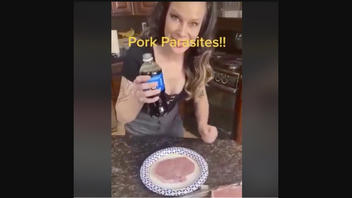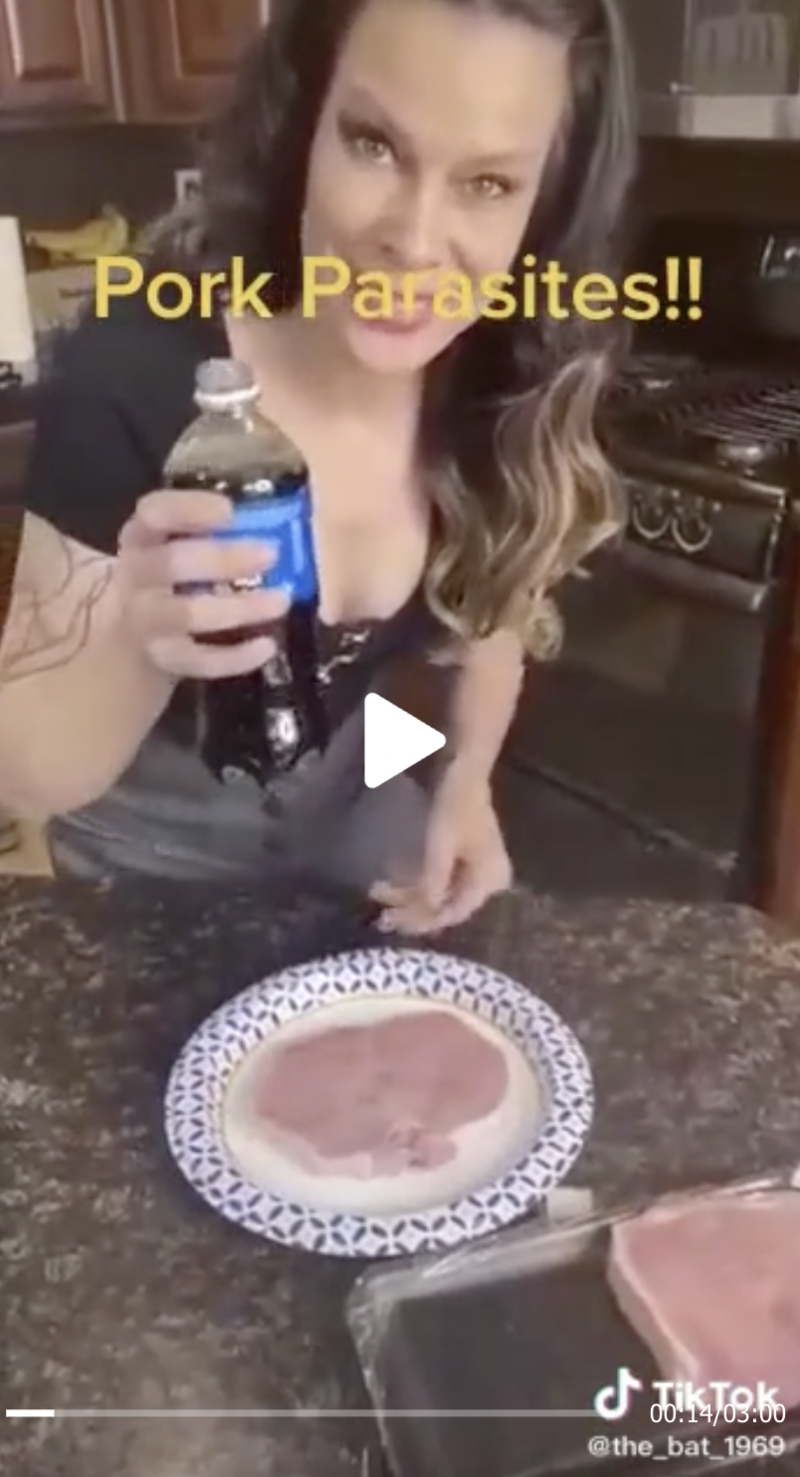
Does pouring the soft drink Pepsi on raw domestic pork cause parasites to appear on the pork's surface? No, that's not true: A parasitologist told Lead Stories that this claim has been "fabricated." Claims about Pepsi's effects on pork parasites have been debunked since at least 2007.
The claim about Pepsi and parasites appeared in a post on TikTok on March 4, 2021. The caption opened:
The Parasites in pork meat hates Pepsi!! #pork #parasites #pepsi
This is how the post appeared on TikTok at the time of the writing of this fact check:
(Source: TikTok screenshot taken on Fri Apr 07 16:44:08 2023 UTC)
In an April 7, 2023, email, Eva Wray, a parasitologist in the Department of Animal Science at the Dale Bumpers College of Agricultural, Food and Life Sciences at the University of Arkansas, told Lead Stories that this claim is "fabricated." She dismissed the possibility that the white squiggles that appear in the meat in the video are nematode parasites, which cause trichinellosis, a disease that, according to the Centers for Disease Control and Prevention (CDC), occurs after eating "raw or undercooked meat of animals infected with the larvae of a species of worm called Trichinella."
Wray wrote:
I seriously doubt that it is nematode parasites. The only nematodes that I know of that are in swine muscles are Trichinella spiralis larvae, and even then, they are microscopic.
Plus, the quality of the video is very poor. Plus, what happened to the meat before they started filming...was it straight from the package/refrigerator or did they let flies get to it and lay eggs (the smaller white fatty 'worms' look more like maggots than anything, but are probably not even that?).
The long 'worm' that comes out looks more like fat or something else that is just being pushed out by the carbonation. Plus, Trichinella in our store-bought, concrete pork is pretty much non-existent...they would have to be eating other Trichinella-infected carnivores in order to perpetuate the life cycle.
If it were a wild-caught boar, then there would be a possibility of infection, but again, the larvae in the nurse cells/muscle cells are microscopic so you wouldn't see them pop out like this with the naked eye. (Side note: Because of this, I would never eat wild-caught boar or any other unregulated or wild-caught carnivore...period, end of story.)
I call bullshit. This was fabricated in some way for the 'likes.'
The CDC concurs that the parasite that causes trichinellosis "is microscopic, so it cannot be seen in infected meat with the naked eye."
Though the disease "used to be more common and was usually caused by ingestion of undercooked pork," the CDC writes that "infection is now relatively rare."
During 2011-2015, 16 cases were reported per year on average. The number of cases decreased beginning in the mid-20th century because of legislation prohibiting the feeding of raw-meat garbage to hogs, commercial and home freezing of pork, and the public awareness of the danger of eating raw or undercooked pork products. Cases are less commonly associated with pork products and more often associated with eating raw or undercooked wild game meats.
Jason Menke, director of consumer public relations for the National Pork Board, also told Lead Stories in an April 6, 2023, email that the video's claim is false:
I'm happy to confirm that this widely and oft debunked claim remains safely and securely in that category. Modern pork production continues to provide shoppers at the grocery meat counter a product free of worms and parasites.
We recommend consumers save their colas (or other favorite beverages) to enjoy with their pork chop that's been properly cooked to 145 degrees Fahrenheit and given a three-minute rest.
Dana Hunnes, a senior clinical dietician at the Ronald Reagan UCLA Medical Center, verified to Lead Stories in an April 6, 2023, email, agreed that no grounds exist for the video's claim:
With regards to whether or not cola causes worms or parasites to come out, I would say, that's not true.
Lead Stories contacted the U.S. Department of Agriculture for a statement about the video's claim and will update this fact check if one is received.


















